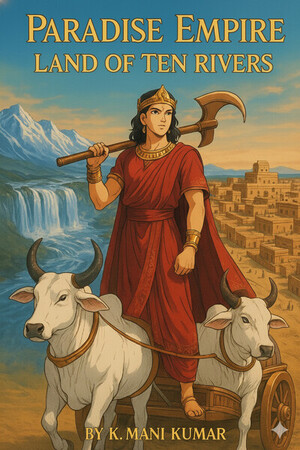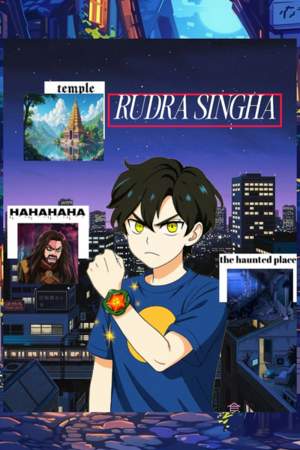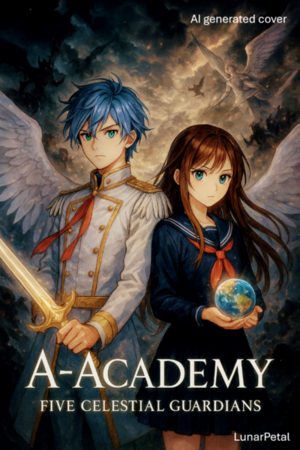Chapter 10:
Chapter 4: The Heart of Civilization — Part 1: Arrival and Politics
The Paradise Empire: The Land of Ten Rivers season 1 part 1
Paradise empire: the land of ten rivers
Chapter 4: The Heart of Civilization — Part 1: Arrival and Politics
(Scene opens: an open road, just after dawn. The sound of birds and a gently flowing river.)
Grandpa’s Voice (Voiceover): “Now, my boy — after Tim’mayya’s recollections of the past, their journey truly began. The stories were over. The road ahead was real. They started the journey toward their destiny: the city of Maniyanūru.”
(Scene shifts: Vīra and Tim’mayya on the chariot. Tim’mayya is now resting, and Vīra is driving, his face set toward the west.)
The sun had been climbing for hours. After Vīra had taken over the reins, Tim’mayya had finally succumbed to exhaustion, dozing against a sack of grain. Vīra let his bulls run, their powerful legs eating up the miles.
They traveled west, following the great artery of the civilization, the Pedda Nadī. The "Great River" was a wide, shimmering expanse of brown and silver, its banks lined with lush grass fields and bustling villages.
The road here was different from the simple paths around Manūrū.
It was a wide, beaten-earth highway, packed with the commerce of the Ten Rivers. Vīra’s chariot, unstoppable, sped past slow, heavy trade caravans, their solid wooden wheels groaning under the weight of cotton bales and salt blocks. He crossed them with ease, the light, spoked wheels of his own vehicle barely whispering over the hard-packed ground.
After several more hours, the landscape changed. The flat fields gave way to rolling hills. Vīra guided the bulls up a long, winding incline. When they reached the crest, Tim’mayya, jostled by the climb, woke up. He rubbed his eyes, stretched, and then froze.
He scrambled to his feet on the flatbed of the chariot, his eyes wide. He pointed a trembling finger far away to the west.
Tim’mayya: “There… Vīra… there it is! Maniyanūru!”
Vīra pulled his bulls to a halt. He stood tall, his hand shielding his eyes from the morning sun.
He saw it.
It was not a village. It was not a town. It was a world.
Even from this distance, miles away on the hill, they could see the endless line of trading bullock carts, looking like a trail of tiny ants, queuing patiently to get inside.
The city itself was a massive, sprawling entity nestled in a wide basin near the Pedda Nadī. It was surrounded by impossibly high, pale yellow walls that gleamed in the sun.
And then, carried on the wind, they heard it — a sound so vast it seemed to come from the earth itself. It was the sound of thousands of voices chanting in unison: a deep, resonant prayer, rising from the city as it greeted the day. Even from miles away, the ancient language of the hymn rose to meet them.
The Hymn of the City
(The camera begins a slow, epic pan over the city of Maniyanūru as the chant rises.)
People (chanting):
1. పంచానేక కిరీటయుక్తమగు రాజ్యశ్రేష్ఠమై, దివ్యమై
ప్రాంచద్ధైర్య గుణాఢ్యమై, దశమహా నదీ ప్రదేశంబులన్
మించున్ నాగరికత్వ హృద్గతియయీన్, శ్రీరాజ్యమై నిల్చినన్
కాంచీపూర్వర మైన మణియానూరంబు వర్ధిల్లగన్.
(Kingdom and Civilization)
Pancaneka kiriitayukta magu rajya sreshtamayi, divyamayi praanchadhairya gunaadhyamayi, dashamaha nadi pradesambulan minchun nagarikathva hrudgatiyayin, shrirajyamayi nilcinan kancheepuravara maina Maniyanuru bu vardhillagan.
(English Translation):
1. Being the best among the five-crowned kingdoms, and being divine. Being rich with expansive courage and virtue, in the region of the ten great rivers. Exceeding and shining as the heart of civilization, established as a glorious kingdom. May that ancient, jewel-like Maniyanūramu flourish (prosper) forever.
(Camera Pan): The camera sweeps over the glorious, huge walls and the main gates. The walls are not rough-hewn stone but built of millions of uniform, pale yellow bricks, thirty men high. Below, the great lower city sprawls — a sea of thousands of red-tiled roofs, perfectly organized and vibrant with life.
People (chanting):
2. వీరయ్య దేవుని తేజంబు వెలయ, శాంతమ్మ శాంతియున్ నిండునట్లు భూరి సంపదలు నదీ రీతి వెలుగొంద, మమ్ము పాలించుమూ మణియానూరా.
( Wealth and Founders)
Virayya devuni tejambu velaya, Shantamma shantiyun nindunatlu bhuri sampadalu nadi reeti velugonda, mammu palinchumu Maniyanura.
(English Translation):
2. May the glory (splendour) of the God Vīrayya shine, and Śāntam'ma's peace be complete; and may vast wealth illuminate (come forth) like the flow of a river. O Maniyanūra, rule over us (govern us).
(Camera Pan): The camera dives into the bustling marketplaces. We see stalls overflowing with silks, copper pots, saffron, and jewels from foreign lands. People of every description — merchants, soldiers, priests, and beggars — crowd the streets. At the center of this lower city stands a massive temple, its gopuram capped in gold. It is the Temple of the God of Glory, Virrayya, and his wife, the Goddess of Peace, Śāntam'ma. Carved above its entrance is the unmistakable symbol of the Horned White Horse.
People (chanting):
3. రాజిల్లుం గుణరత్న ధామమయి నిత్యం బర్థి రక్షింపుచున్
రాజీవాకర బంధు కీర్తి విధి నారాధింపుచున్ మాదొసల్
తేజోవంతుల రీతిగా పరిహరించి, యుగాంత మయ్యెంంతకున్
రాజంబున్ మణియానూరంబు స్థిరమై రంజిల్లగాకన్ సదా.
( Eternal Reign and Protection)
Rajilum gunaratna dhamamayi nityam barthi rakshimpucun rajivakara bandhu keerti vidhi naradhimpucun madosal tejovantula ritiga pariharinchi, yugaanta mayyentakun rajambun Maniyanurambu sthiramai ranjillagakan sada.
(English Translation):
3. Shining forth as a dwelling of jewel-like virtues, perpetually protecting its devotees (seekers). Worshipping the law (method) of the sun's fame, and remedying our faults (mistakes) like the glorious ones. Until the end of the Age (Yuga-end), may that Kingdom, Maniyanūramu, be stable and shine brightly forever.
(Camera Pan): The camera glides over the city’s masterful infrastructure. We see great public baths built of stone, with separate levels for the Lower City, Middle City, and Higher City. Two massive, man-made water canals cut through the city, bringing fresh water from the river. We see intricate drainage systems — stone-lined gutters running from every house — and countless public wells where citizens draw drinking water. It is a marvel of ancient engineering.
People (chanting):
4. భీతిన్ నీదు యశంబు విన్న దనుజుల్ మృత్యు భయంబందుచున్
ఛేతస్ తాము దహించుచున్ దొలగుచున్ జేరున్ కడున్ దూరమున్
నీ తేవంబున రాజ్యంబున్ స్థిరమగున్ నిత్యంబు సంతోషమున్
మా పితృన్ మణియానూరా! పరులన్ మర్దించుచున్ బ్రోవుమా.
(Terror of the enemies)
Bhitin nidu yashambu vinna danujul mrtyu bhaya banducun cetas tamu dahinchucun dolagucun jerun kadun dooramun ni tevambuna rajyambun sthiramagun nityambu santoshmun ma pitrun Maniyanura! parulan mardinchucun brovuma.
(English Translation):
4. Just upon hearing your name, all enemies are seized with fear, along with the dread of death. The wicked will flee. O our great father Maniyanūra, crush the enemies and protect us.
(Camera Pan): The camera sweeps along the immense city walls, revealing the source of this terror. A 15,000-strong army patrols its battlements. We see the five-fold army: infantry in shining bronze cuirasses, cavalry on swift horses, disciplined archers, rows of thundering war elephants clad in armor, and gleaming bronze war chariots. Their weapons are a mix of bronze and dark, deadly iron. Five thousand guards patrol the Lower City gates, five thousand hold the Middle City walls, and five thousand elite soldiers guard the Higher City.
People (chanting):
5. వీరయ్య సుతుడైన ధీరుండు దీరయ్య, నిన్ను స్థాపించెన్ నిశ్చయముగా శాంతమ్మ పురివి, దైవాల ఆశీస్సుచే, నీ వంశంబు శాశ్వతంబై ఏలుగాక.
(Dynasty and Blessings)
Virayya sutudaina dhirundu Dirayya, ninnu sthapinchen nischayamuga
Shantamma purivi, daivala asissuche, ni vamshambu shashvatambai elugaka.
(English Translation):
5. Dīrayya, the wise son of Vīrayya, assuredly established you (the city). You are the city of Śāntam'ma; by the blessings of the gods, may your dynasty rule eternally.
(Camera Pan): The camera focuses again on the great temples. Hundreds of people move in waves toward the gates — a constant river of devotion. Inside the temple courtyards, priests in white and saffron robes raise their hands, chanting prayers to the great statues of Virrayya and Śāntam'ma.
People (chanting):
6. ఉద్వేలంబుగ మణియానూరంబు, సువర్ణ సూర్య ధ్వజమై తేజంబొప్ప రత్న సింహాసనస్థుండై, దైవంబునై రాజిల్లే పితృ మాతృ రీతి రక్షింపుచున్, శాశ్వతమై రాజంబున్ నిరతంబున్ కావుమా మమ్ములన్, పరమ గతిన్.
(Throne, Protection, and Refuge)
Udveelambuga Maniyanurambu, suvarna surya dhvajamai tejaboppa ratna simhasana sthundai, daivambunai rajille pitru matru riti rakshipucun, shashvatamai rajambun nirataṁbun kavuma mamulan, paramagatin.
(English Translation):
6. Wonderfully, the Maniyanuru Kingdom — the Golden Sun's flag, shining brightly, seated upon the jeweled throne, and being a god. Shining forth, protecting us in the manner of a father and mother: O eternal one (city), O Kingdom, protect us perpetually; you are our ultimate refuge (parama gati).
(The hymn ends. A final, powerful conch blast echoes across the land.)
(Camera Pan): The camera completes its journey, panning up past the Middle City to the Higher City, which sits on a great, fortified plateau. At its very peak stands the mighty palace, a structure so vast it seems to be reaching the clouds themselves. It is guarded by hundreds of elite soldiers. From its highest spire, a massive flag flies: a Golden Sun in the center of a deep blue field.
Tim’mayya’s Voice (narrating): “This was Maniyanūru, the City of the Jeweled Golden Throne — a city of 100,000 people, which would swell to 150,000 during the festival and business seasons.”
The Call of the City
(The camera pans back down the hill to Vīra and Tim’mayya.)
Tim’mayya was breathless, his eyes wide with wonder. Vīra, however, was shaking.
As the hymn washed over them, Vīra felt an intense, burning heat on his shoulder. He looked down. Through the fabric of his tunic, the symbol of the Horned White Horse on his right shoulder was glowing a deep, pulsing red, visible even in the bright morning light.
He was not stunned. He was not in awe. It was something far deeper: a sudden, crushing weight of emotion — of longing, of memory, of profound arrival — welled up inside him. Tears streamed from his eyes, and his knees buckled. He trembled and staggered back, nearly falling from the chariot.
Tim’mayya grabbed him instantly, holding him steady.
Tim’mayya: “Vīra! Vīra, are you okay? What is it? Are you ill?”
Vīra grasped Tim’mayya’s arm, his knuckles white. He looked at the gleaming city, his voice choked with a feeling he couldn't name.
Vīra: “I… I don’t really understand, Tim’ma. What is this feeling? I can’t understand it. It feels… it feels just as if a mother (the city) is calling to her child (Vīra). This is my first time seeing it, but my heart… my heart is rising. It’s almost... divine. Holy. What connection do this city and I have?”
Tim’mayya, thoroughly stunned and scared, forced himself to be pragmatic. Tim’mayya: “Okay, okay — calm down. It’s... it’s probably just the side effect of the long journey. The sun is hot. You're overwhelmed. We’ll just get to the city, find a place, and settle for a while, okay? Just breathe, Vīra.”
Vīra nodded, slowly regaining his composure, though the tears still tracked through the dust on his face. He wiped them away and took a deep, shuddering breath. His gaze lifted, past the Lower City, past the Middle City, to the very top of the highest hill.
He looked at the mighty palace.
The Golden Throne Room
(The camera moves, soaring upwards from Vīra’s point of view across the city to the mighty palace. It passes the one hundred elite guards and flies through an open archway into the Royal Court Room of Maniyanūru — also known as the Golden Throne Room.)
The hall was vast, its ceiling held up by pillars carved like giant elephants. At the far end, on a high platform, sat the mighty golden, jeweled throne. Just below it sat three smaller, though still magnificent, thrones.
Dozens of ministers, scholars, and generals stood in silent rows, their rich robes a tapestry of color.
A soldier, his voice booming, struck his spear on the marble floor. Soldier (Herald): “Be alert! The divine royal family! The Mighty Divineship, King Manirāja Dīrākṣa! The Divine Queen, Rathnavallī Ādiyammādevi! The Divine Crown Prince, Raghavendra! And the twin sister of the great Divine Crown Prince and dear daughter of the Divine King and Queen, the Divine Princess Nīlavēṇi... have arrived!”
Every minister in the hall dropped into a deep bow.
The royal family entered. King Manirāja Dīrākṣa, a man in his later years but still possessing an aura of immense power, walked straight to the golden, jeweled throne and sat upon it.
His family followed. Queen Rathnavallī Ādiyammādevi and Princess Nīlavēnī sat on two of the lower thrones. The Crown Prince Raghavendra sat on the third. The Queen and Princess Nīlavēnī looked at each other and shared a subtle, proud smile. The Princess then turned her gaze to her twin brother, Prince Raghavendra, who gave her a single, composed nod.
King Manirāja Dīrākṣa looked out over his court. King Manirāja: “Today, I call upon this court for a special reason. I have taken an important decision regarding the kingdom. As I am getting older, I have decided that I should give my throne and the responsibility of this glorious kingdom into the hands of my son, Prince Raghavendra.”
A quiet murmur swept the hall. The ministers looked at each other — some in approval, some in shock.
The King continued, his voice firm. King Manirāja: “Within a few weeks, we will have the grand festival of the gods Virrayya and goddess Śāntam'ma, and of their first son, Dīrayya, Lord of Valor. It was our progenitor, Dīrayya, who laid the first brick of this city over eons ago. On that same, most auspicious day, the Coronation of Raghavendra will take place.”
The ministers, accepting the royal decree, bowed their heads in agreement. King Manirāja Dīrākṣa then rose from his throne. (Correction: The King's title was corrected from King Manirāja to King Manirāja Dīrākṣa for consistency.) His family — Queen Ādiyammādevi, Princess Nīlavēnī, and Prince Raghavendra — did the same.
King Manirāja: “It is our custom to go and take blessings at the main temple, which is in the Lower City, and announce this proclamation in front of the people. Everyone, let us go.”
The King and his family started leaving the court, and the ministers followed them.
The Collision of Fates
(Scene shifts: back to Vīra and Tim’mayya on the hill path.)
Vīra, his breathing now steady, his mystical feeling settling into a deep, humming certainty, took up the reins.
Vīra: “Let’s go, Tim’ma.”
The bulls started heading down the hill toward the great gates of the city. From their high view on the path, the city, built of pale yellow brick and topped with golden gopurams, seemed to be shining in a golden light as the sun reflected off its surfaces.
(The camera shows the royal procession descending from the palace in the Higher City, while Vīra’s chariot descends from the hills. They are moving toward the same point: the great walls of the Lower City.)
Grandpa’s Voice (Voiceover): “The decision was taken at the same moment Vīra arrived. A king had decided to step down. A new king was about to be made. And Vīra, the man who would one day change civilization itself, was just arriving at the gates. This, my boy, is how it began.”
(End of Chapter 4, Part 1)




Please sign in to leave a comment.